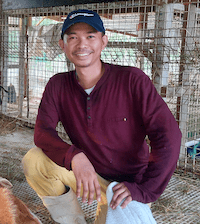Manila, Philippines – In a recent announcement, the World Health Organization (WHO) expressed apprehension regarding the growing number of bird flu outbreaks among mammals and the potential transmission of the virus to humans.
The warning was released by the organization on Wednesday, underscoring the gravity of the situation.
Since late 2021, Europe has been contending with its most severe bird flu outbreak on record, with significant outbreaks also recorded in North and South America.
To curb the spread, millions of infected poultry worldwide, primarily carrying the H5N1 strain that emerged in 1996, have been culled.
Nevertheless, the WHO has noted a worrisome surge in infections among mammals, which are genetically closer to humans than birds.
This development raises concerns about the virus’s increased adaptability to infect humans.
The organization further cautions that certain mammals could serve as mixing vessels for influenza viruses, potentially giving rise to novel and more pernicious viruses that affect both animals and humans.
The documented outbreaks have impacted 26 species, including farmed mink in Spain and sea lions in Chile.
Cats in Poland have also recently been found to be infected with H5N1.
In collaboration with the United Nations’ Food and Agriculture Organization (FAO) and the World Organisation for Animal Health (WOAH), the WHO is calling for international cooperation to protect animals and ensure the safety of humans.
WOAH’s science chief, Gregorio Torres, emphasizes the necessity of global concern as avian influenza expands its reach to new geographic regions, resulting in atypical wild bird die-offs and a concerning surge in mammalian cases.
Human infections can lead to severe diseases with high mortality rates.
Most human cases of bird flu are attributed to direct or indirect exposure to infected live or deceased poultry or contaminated environments.
Sylvie Briand, the WHO’s pandemic preparedness chief, reassures that the virus does not currently possess efficient human-to-human transmission capabilities.
However, she underscores the importance of remaining vigilant in order to detect any changes in the virus that might alter this scenario.
Experts are actively monitoring for variations that could pose a greater risk to humans and are urging countries to enhance their surveillance capabilities.
Briand highlights the significance of this effort, particularly for countries with limited prior experience in avian flu surveillance.
According to the WHO, a viral variant has caused an “unprecedented” number of deaths in wild birds and poultry across Africa, Asia, and Europe since 2020.
The virus subsequently spread to North America in 2021 and Central and South America in 2022.
Last year, highly pathogenic H5N1 bird flu outbreaks were reported in 67 countries across five continents, resulting in the loss of over 131 million domestic poultry due to death or culling in affected areas.
In 2023, an additional 14 countries reported outbreaks, primarily in the Americas, indicating the continued spread of the disease.
These outbreaks have inflicted significant damage on poultry populations, severely impacting the livelihoods of farmers and impeding the food trade, as highlighted by the WHO.
While the primary impact is on animals, the WHO warns that these outbreaks persistently pose risks to humans.
The organization has observed several instances of mass bird deaths and emphasizes the necessity of sustained vigilance.
Keith Sumption, the chief veterinary officer of the FAO, states that the epidemiology of H5N1 is rapidly evolving.
Sumption urges the timely sharing of genetic sequences to monitor for changes, which can lead to improved risk assessment and disease control.
Click here to watch Alpha Agventure’s bird flu-related videos in Filipino (Tagalog).

Mr. Jaycee de Guzman is a self-taught agriculturist and the founder and patriarch of Alpha Agventure Farms, recognized as the leading backyard farm in the Philippines. With a rich background in livestock farming dating back to the early 1990s, Mr. de Guzman combines his expertise in agriculture with over 20 years of experience in computer science, digital marketing, and finance. His diverse skill set and leadership have been instrumental in the success of Alpha Agventure Farms.


